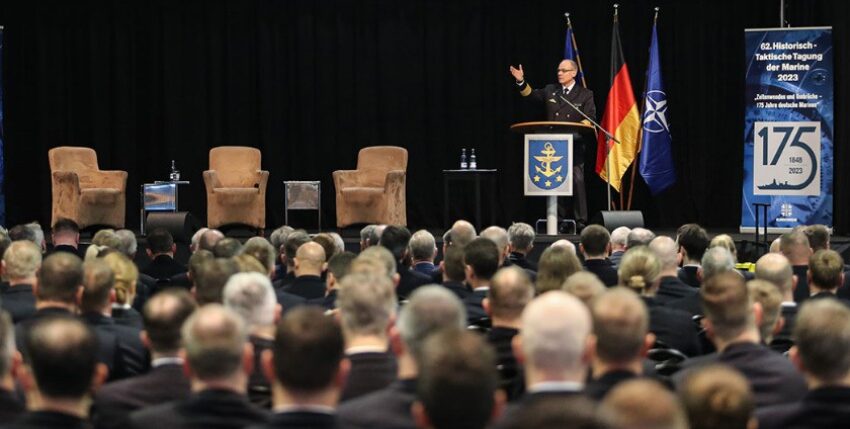A glance at the HiTaTa auditorium once again suggests that "age before ambition" was a key criterion when compiling the invitation list. But this is hardly the way to initiate innovative and fruitful discussions.
I am delighted and inspired by the tangible sense of community in the event room in Linstow. The discussions of those present hang heavy in the air as they engage in heated debates between the presentations. The uniformly navy blue-coloured crowd sips from their coffee cups. I feel, as I haven't for a long time, that I am part of We. Even if we don't all share the same opinion, we have made the pilgrimage to the secluded resort to exchange ideas and discuss and solve the many problems facing the navy. But personal details are also analysed over a beer, contracts are discussed through official channels and the odd business card changes hands. The relaxed atmosphere encourages some people to speak more honestly and directly to the authorities, and the anonymity of the online question tool Menti also supports this tendency. Problems are put on the table for all to see and are discussed. Initiated by very well-researched presentations by young officers who provocatively point out grievances and question the typical "that's the way it is". One person feels caught out, the next motivated and yet another perhaps even attacked. All of this is allowed during these two days. The Historical-Tactical Conference offers a tool in the toolbox of modern leadership that Count von Baudissin could hardly have dreamed of more beautifully for his model of Innere Führung.
But who can take part in this event and enjoy the mental stimulation far away from everyday problems and the daily grind?
In addition to the who's who of naval leadership, it is mainly captains, all of whom tend to be older, who come to Linstow. With the compulsory invitation of all A 16s and upwards, the circle of participants is clearly set. The huge accumulation of expertise in the front rows offers the opportunity to compare the past with the present through contemporary witness reports. What is missing, however, are young and wild people who, with a knife between their teeth, make targeted and practised cuts to the dusty topics of tradition or personnel development in order to adapt them to the modern zeitgeist and innovation. This becomes clear when addressing the challenges of recruiting Generation Z staff. Here, a suitable bait is sought for this fish, but without involving the fish in the debate. This may result from the ritualised invitation of a fixed cadre with regulars' table flags. How, I ask, is this supposed to generate a fresh, controversial exchange? Why should a young officer carve out what little time he has if he has to worry about not getting one of the golden tickets or, worse still, having to hand them in again if a higher rank or a regular guest demands them? The opportunity for rejuvenation clearly needs to be vigorously pursued here. A quota system for invitations for the purpose of simple maths seems conceivable. For every B 3, an A 11 must also be invited, which corrects the sum of all salaries downwards. The idea of a HiTaTa with four generations exchanging ideas and networking could be turned from a slogan into reality.
Another group of officers is missing: those from the armed forces base. The presentations very often talk about the need to think in terms of the armed forces as a whole. Getting these officers to focus on the latest goals and the hottest problem areas could also lead to positive synergy effects here and also give them back their maritime identity.
The fact that travelling long distances is problematic for everyone could also be solved quickly, easily and cost-effectively with hybrid events. With this option, however, the commander of the fleet and support forces must decide whether the outstanding texts and discourse or the shared beer in the evening should be the focus of the event in future. A possible change in image could also lead to a change in the group of participants.
For me, HiTaTa is and remains a perfect forum for innovation, thought experiments and exchange, a blueprint for inner leadership. If we make some adjustments and rethink the distribution of seating, do not let the opportunity of digitalisation pass us by, not only demand joint and combined, but also invite it, then a colourful potpourri can emerge that carries exciting thoughts from the core into the entire navy and from which everyone feels carried away to give MEER for us.
Caroline Wegener










